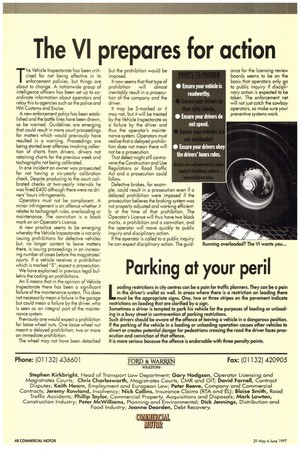The VI prepares for action
Page 50

If you've noticed an error in this article please click here to report it so we can fix it.
The Vehicle Inspectorate has been criticised for not being effective in its enforcement policies, but things are about to change. A nationwide group of intelligence officers has been set up to coordinate information about operators and relay this to agencies such as the police and HM Customs and Excise.
A new enforcement policy has been established and the battle lines have been drawn, so be warned. Guidelines are emerging that could result in more court proceedings for matters which would previously have resulted in a warning. Proceedings are being started over offences involving collection of charts from drivers, drivers not retaining charts for the previous week and tachographs not being calibrated,
In one incident an owner was prosecuted for not having a six-yearly calibration check. Despite producing to the court calibrated checks at Iwo-yearly intervals he was fined £400 although there were no drivers' hours infringements.
Operators must not be complacent. A minor infringement is an offence whether it relates to tachograph rules, overloading or maintenance. The conviction is a black mark on an Operator's Licence.
A new practice seems to be emerging whereby the Vehicle Inspectorate is not only issuing prohibitions for defective vehicles but, no longer content to leave matters there, is issuing proceedings in an increasing number of cases before the magistrates' courts. If a vehicle receives a prohibition which is marked "S" expect a prosecution.
We have explained in previous legal bulletins the coding on prohibitions.
An S means that in the opinion of Vehicle Inspectorate there has been a significant failure of the maintenance system. This does not necessarily mean a failure in the garage but could mean a failure by the driver, who is seen as an integral part of the maintenance system. Previously one would expect a prohibition for loose wheel nuts, One loose wheel nut meant a delayed prohibition; two or more an immediate prohibition.
The wheel may not have been detached
but the prohibition would be imposed. It now seems that that type of
prohibition will almost inevitably result in a prosecution of the company and the driver.
It may be S-marked or it may not, but it will be treated by the Vehicle Inspectorate as a failure by the driver and thus the operator's maintenance system. Operators must realise that a delayed prohibition does not mean there will not be a prosecution.
That defect might still contravene the Construction and Use Regulations or Road Traffic Act and a prosecution could follow.
Defective brakes, for example, could result in a prosecution even if a delayed prohibition were imposed if the prosecution believes the braking system was not properly adjusted and working efficiently at the time of that prohibition. The Operator's Licence will thus have Iwo black marks, a prohibition and a conviction, and the operator will move quickly to public inquiry and disciplinary action. lithe operator is called to a public inquiry he can expect disciplinary action. The guid once for the licensing review boards seems to be on the basis that operators only go to public inquiry if disciplinary action is expected to be taken, The enforcement net will not just catch the cowboy operators, so make sure your preventive systems work.












































































































